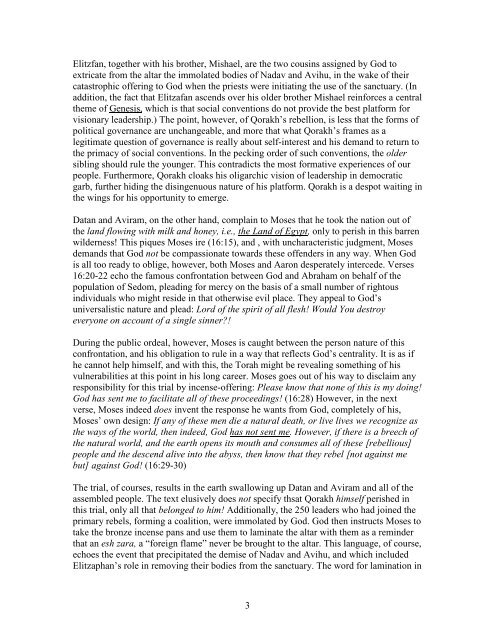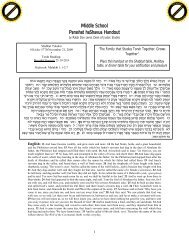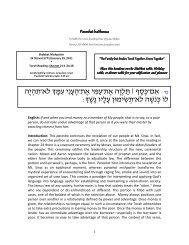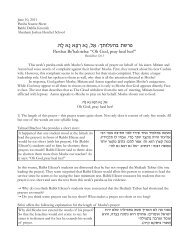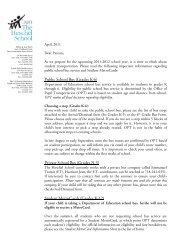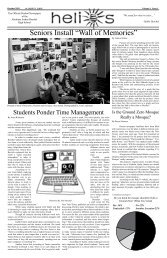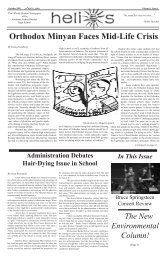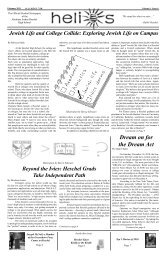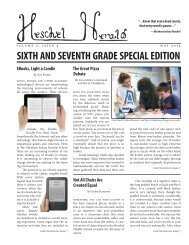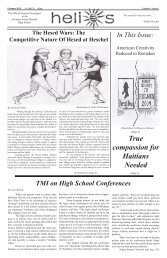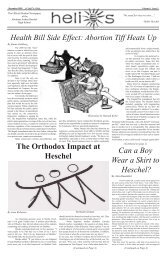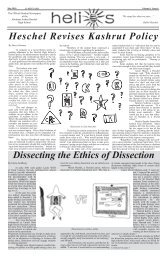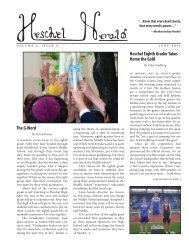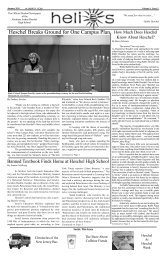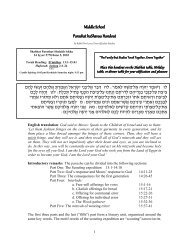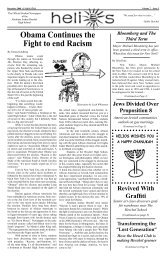Korah - The Heschel School
Korah - The Heschel School
Korah - The Heschel School
You also want an ePaper? Increase the reach of your titles
YUMPU automatically turns print PDFs into web optimized ePapers that Google loves.
Elitzfan, together with his brother, Mishael, are the two cousins assigned by God to<br />
extricate from the altar the immolated bodies of Nadav and Avihu, in the wake of their<br />
catastrophic offering to God when the priests were initiating the use of the sanctuary. (In<br />
addition, the fact that Elitzafan ascends over his older brother Mishael reinforces a central<br />
theme of Genesis, which is that social conventions do not provide the best platform for<br />
visionary leadership.) <strong>The</strong> point, however, of Qorakh’s rebellion, is less that the forms of<br />
political governance are unchangeable, and more that what Qorakh’s frames as a<br />
legitimate question of governance is really about self-interest and his demand to return to<br />
the primacy of social conventions. In the pecking order of such conventions, the older<br />
sibling should rule the younger. This contradicts the most formative experiences of our<br />
people. Furthermore, Qorakh cloaks his oligarchic vision of leadership in democratic<br />
garb, further hiding the disingenuous nature of his platform. Qorakh is a despot waiting in<br />
the wings for his opportunity to emerge.<br />
Datan and Aviram, on the other hand, complain to Moses that he took the nation out of<br />
the land flowing with milk and honey, i.e., the Land of Egypt, only to perish in this barren<br />
wilderness! This piques Moses ire (16:15), and , with uncharacteristic judgment, Moses<br />
demands that God not be compassionate towards these offenders in any way. When God<br />
is all too ready to oblige, however, both Moses and Aaron desperately intercede. Verses<br />
16:20-22 echo the famous confrontation between God and Abraham on behalf of the<br />
population of Sedom, pleading for mercy on the basis of a small number of rightous<br />
individuals who might reside in that otherwise evil place. <strong>The</strong>y appeal to God’s<br />
universalistic nature and plead: Lord of the spirit of all flesh! Would You destroy<br />
everyone on account of a single sinner?!<br />
During the public ordeal, however, Moses is caught between the person nature of this<br />
confrontation, and his obligation to rule in a way that reflects God’s centrality. It is as if<br />
he cannot help himself, and with this, the Torah might be revealing something of his<br />
vulnerabilities at this point in his long career. Moses goes out of his way to disclaim any<br />
responsibility for this trial by incense-offering: Please know that none of this is my doing!<br />
God has sent me to facilitate all of these proceedings! (16:28) However, in the next<br />
verse, Moses indeed does invent the response he wants from God, completely of his,<br />
Moses’ own design: If any of these men die a natural death, or live lives we recognize as<br />
the ways of the world, then indeed, God has not sent me. However, if there is a breech of<br />
the natural world, and the earth opens its mouth and consumes all of these [rebellious]<br />
people and the descend alive into the abyss, then know that they rebel [not against me<br />
but] against God! (16:29-30)<br />
<strong>The</strong> trial, of courses, results in the earth swallowing up Datan and Aviram and all of the<br />
assembled people. <strong>The</strong> text elusively does not specify thsat Qorakh himself perished in<br />
this trial, only all that belonged to him! Additionally, the 250 leaders who had joined the<br />
primary rebels, forming a coalition, were immolated by God. God then instructs Moses to<br />
take the bronze incense pans and use them to laminate the altar with them as a reminder<br />
that an esh zara, a “foreign flame” never be brought to the altar. This language, of course,<br />
echoes the event that precipitated the demise of Nadav and Avihu, and which included<br />
Elitzaphan’s role in removing their bodies from the sanctuary. <strong>The</strong> word for lamination in<br />
3


